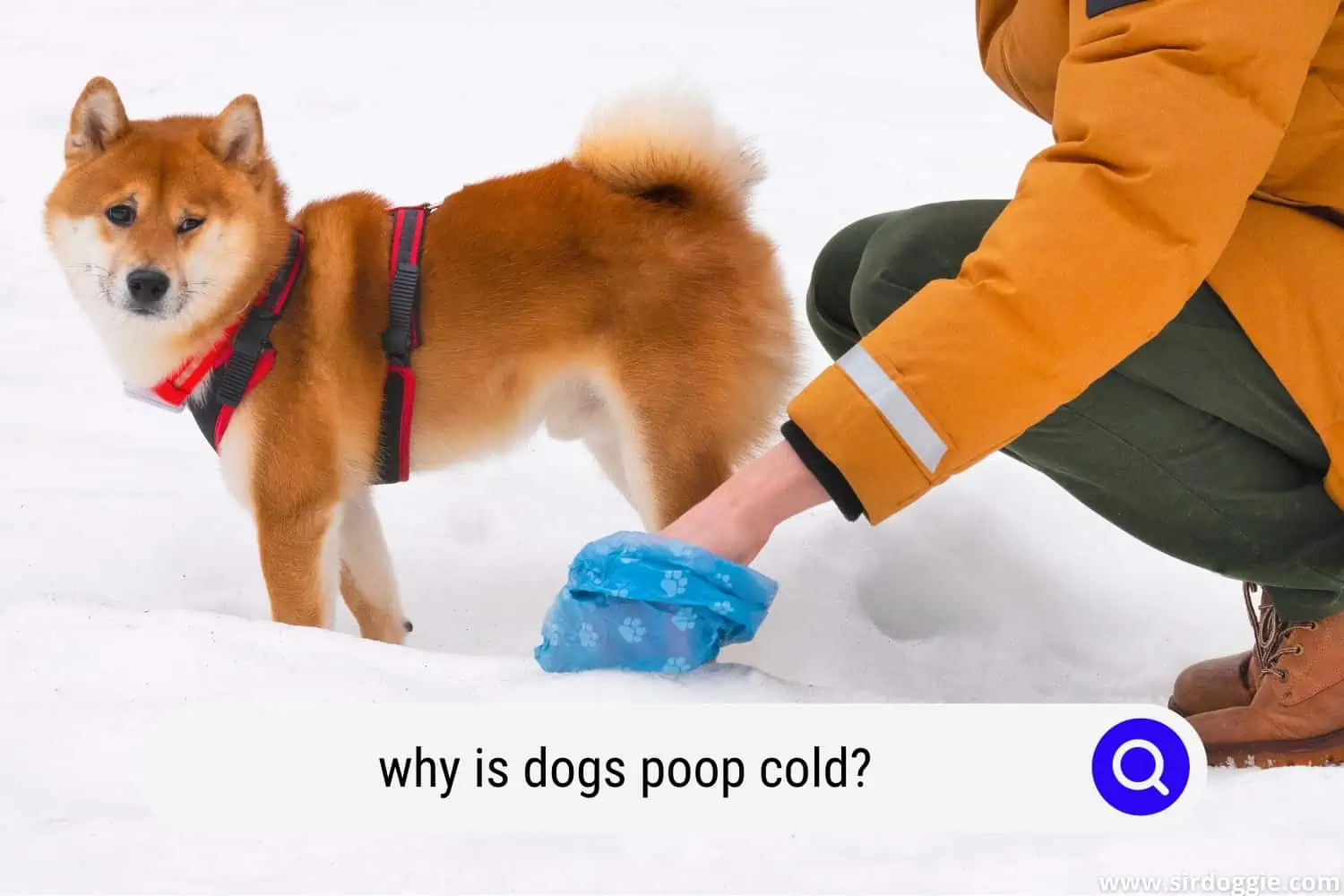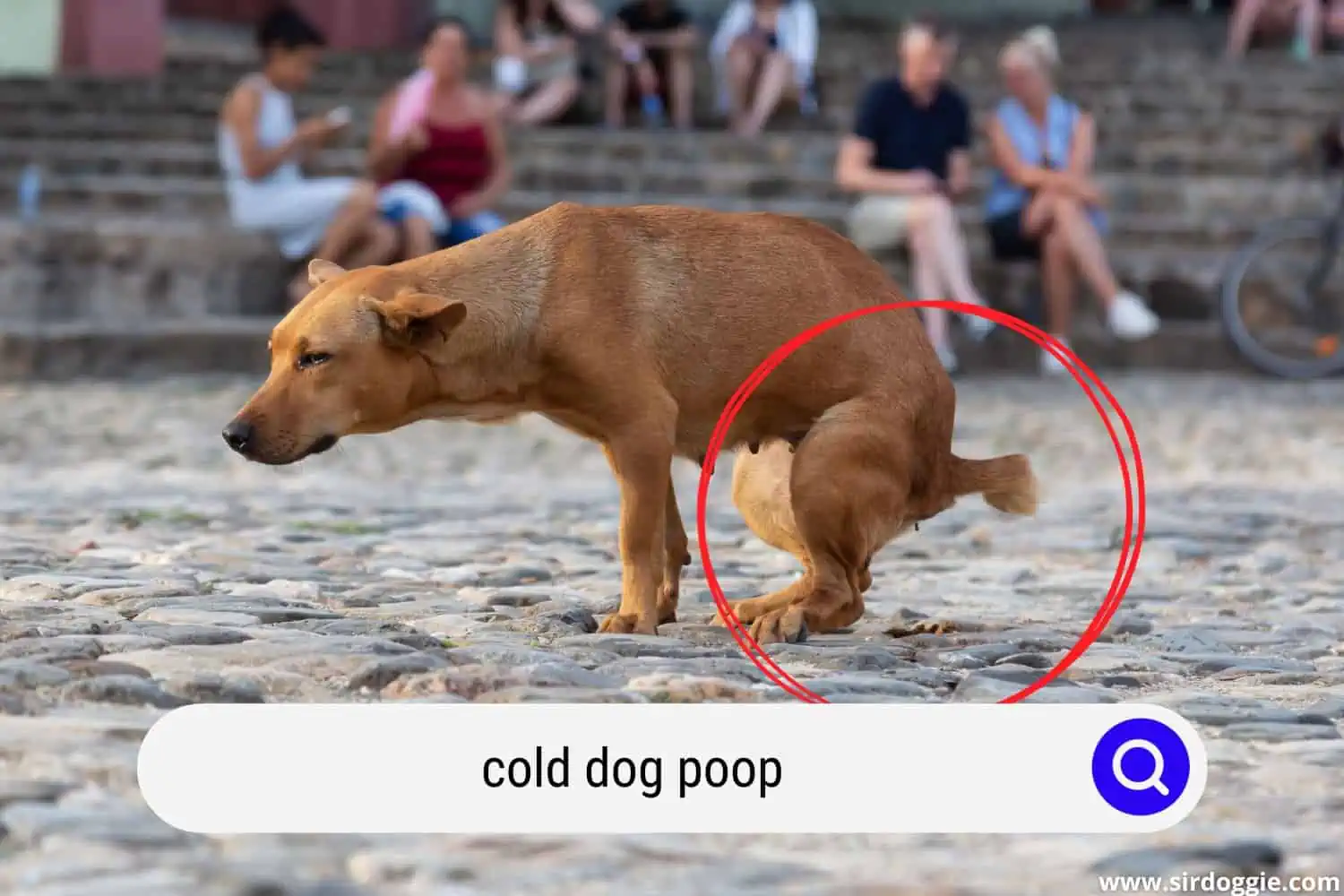Why is Dogs Poop Cold? (A Detailed Explanation)
As a dog parent, you may find yourself worrying over dog stool/poop from time to time. You might be wondering what’s normal when it comes to the poop’s color, shape, and consistency. Your pet’s poop often serves as an essential sign of his or her health—and, as a rule, veterinarians will inquire about your dog’s poop, so it’s crucial to be aware of what to notice.
When evaluating dog feces, the four Cs—color, consistency, content, and coating—are the most important factors to take note of, and your vet usually addresses the issues if there are any abnormalities with any of the four Cs. But does dog poop temperature matter? Or why would dog poop be cold?

Dog poop temperature matters in determining canine health, and cold dog poop is not a good sign. Cold dog poop can have many causes. It may occur due to certain viruses—which may lead to sneezing, coughing, diarrhea, and cold stools—or your dog’s cold stools may be due to complications in postoperative care (especially in the gastrointestinal tract).
Other reasons for cold stools can include human error (you may simply confuse a pile of older poop and new poop), freezing temperatures in the environment, or the dog’s age. Older dogs may have slightly colder poops when compared to young dogs.
However, keep in mind that whatever the reason your dog’s poop may be cold, it is not normal. In any case of persistent cold poop, take your dog to the veterinarian so they can examine him or her and assist in providing the best possible outcome.
Related Reading: Complete Breakdown Of Dog Poop Decomposition In 9 Weeks
How Does Normal Dog Poop Appear?
Regardless of your dog’s age (whether a puppy or an old dog), his or her feces should stay relatively the same. Over time, you will begin to recognize your dog’s “normal” poop pattern characteristics. The amount of poop may vary depending on the type of food and the volume consumed, however.
In reality, your dog’s food is one of the most important variables in determining their overall health. Therefore, their poop is closely tied to their health: the better the food, the healthier their poop.
Every one of the four C’s has been broken down into its constituent parts, and the features of healthy feces are described below.
Color
The color of your dog’s feces should be a rich cocoa brown—consider the term “poop brown.” This means that there is no intestinal hemorrhage. The brown coloration should be reasonably homogeneous throughout, and there should be no streaks of other colors or tints visible.
Consistency
When examining a dog’s feces, veterinarians use the “Consistency Scale.” The scale ranges from 1 to 7. A reading of “1” indicates very firm, solid feces, whereas a reading of “7” indicates excessively watery and nearly liquid diarrhea.
The ideal consistency of your pup’s feces should be between 2-3. However, this will change from time to time based on their meals. Anything that is excessively runny signals there is some form of sickness in general.
Content
To put it another way, if your pup is healthy, there should be nothing in his or her poop. The presence of fur or food is possible, but only in trace amounts. If you notice anything more than this, you should consult your veterinarian.
Unless you dissect your dog’s stools, it’s impossible to view the contents thoroughly, so make sure to use gloves or bring a sample to your veterinarian if you decide to do so.
Coating
Your dog’s feces should be free of any coating, just like its composition. When picking up your dog’s poop, take a close look at the grass or ground to see whether there are any sticky or wet leftovers. This indicates that the feces were coated. This coating may indicate that your pet isn’t digesting his or her food properly.
Why is My Canine Companion Scooting on His Bum/Tummy?
Scooting, whether on their bums or their tummies, is common in dogs, especially if they are experiencing digestive issues such as loose feces. The behavior of your dog, as well as the consistency of their feces, should be closely monitored. By doing so, if your dog appears to be in any discomfort or pain and bottom scooting becomes a regular behavior beyond the first post-poo bum wipe, you can bring this to the attention of your veterinarian.
The fact that your dog is scooting on their bum may also indicate that they are suffering from obstructed anal glands.
Why Does My Pup’s Stool Change Once He Begins Eating a New Diet?
Changes in your dog’s diet may have an impact on their stools, at least for a short period. Just as we go through a time of adjustment when we eat new foods in a distant place, your pup will also go through a period of adjustment when you introduce them to new meals.
FAQs
Why is My Dog’s Poop White?
The presence of white dog feces indicates a problem. Several factors can contribute to a dog’s stool turning white, but white feces should never be considered normal.
White feces in dogs may be caused by an imbalance in their nutrition, a pharmaceutical side effect, a disease within the body, or a parasitic infection.
Why Is There Blood in My Dog’s Poop?
When you notice blood in your dog’s feces, it’s natural to be concerned. A variety of different factors can cause blood in your dog’s stool. Food allergies, constipation, ingesting something improper, bacterial or viral illness, and colitis are common causes of a dog pooping blood.
Other causes include stress or injury. You should consult with your veterinarian to rule out potentially life-threatening illnesses such as cancer, toxicity (e.g., rat poison), obstructions, parvovirus, or hemorrhagic gastroenteritis. If your dog has bloody stools, you should seek medical attention immediately.

Is It Possible for a Dog to Poop Blood When Stressed?
Stress is a major cause of colitis in dogs, and it can result in your dog passing blood in its stools as well. Stress-triggered colitis can be caused by various factors, including environmental changes (such as moving to a new home) and anxiety-inducing circumstances (such as thunderstorms or explosions), among others. Stress colitis symptoms usually subside after a few days, but you should still consult with a veterinarian to ensure that your dog is not suffering from something else.
Related Reading: How Long Can a Dog Hold Its Poop?

Family Dog Expert Author
Hi there! I’m Stuart, a devoted dog lover and family dog expert with over a decade of experience working with our furry companions. My passion for dogs drives me to share my knowledge and expertise, helping families build strong, loving bonds with their four-legged friends. When I’m not writing for SirDoggie, you’ll find me hiking, playing with my beautiful dog, or studying music.